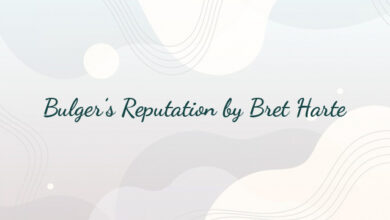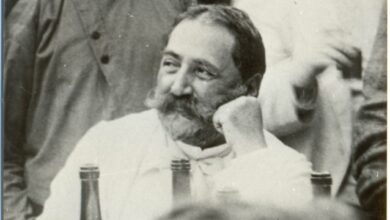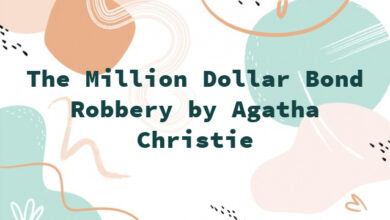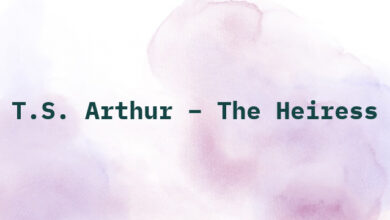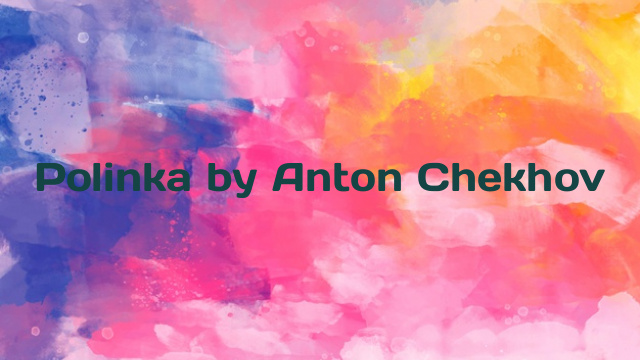
Polinka by Anton Chekhov
IT is one o’clock in the afternoon. Shopping is at its height at the “Nouveaut’s de Paris,” a drapery establishment in one of the Arcades. There is a monotonous hum of shopmen’s voices, the hum one hears at school when the teacher sets the boys to learn something by heart. This regular sound is not interrupted by the laughter of lady customers nor the slam of the glass door, nor the scurrying of the boys.
Polinka, a thin fair little person whose mother is the head of a dressmaking establishment, is standing in the middle of the shop looking about for some one. A dark-browed boy runs up to her and asks, looking at her very gravely:
“What is your pleasure, madam?”
“Nikolay Timofeitch always takes my order,” answers Polinka.
Nikolay Timofeitch, a graceful dark young man, fashionably dressed, with frizzled hair and a big pin in his cravat, has already cleared a place on the counter and is craning forward, looking at Polinka with a smile.
“Morning, Pelagea Sergeevna!” he cries in a pleasant, hearty baritone voice. “What can I do for you?”
“Good-morning!” says Polinka, going up to him. “You see, I’m back again. . . . Show me some gimp, please.”
“Gimp — for what purpose?”
“For a bodice trimming — to trim a whole dress, in fact.”
“Certainly.”
Nickolay Timofeitch lays several kinds of gimp before Polinka; she looks at the trimmings languidly and begins bargaining over them.
“Oh, come, a rouble’s not dear,” says the shopman persuasively, with a condescending smile. “It’s a French trimming, pure silk. . . . We have a commoner sort, if you like, heavier. That’s forty-five kopecks a yard; of course, it’s nothing like the same quality.”
“I want a bead corselet, too, with gimp buttons,” says Polinka, bending over the gimp and sighing for some reason. “And have you any bead motifs to match?”
“Yes.”
Polinka bends still lower over the counter and asks softly:
“And why did you leave us so early on Thursday, Nikolay Timofeitch?”
“Hm! It’s queer you noticed it,” says the shopman, with a smirk. “You were so taken up with that fine student that . . . it’s queer you noticed it!”
Polinka flushes crimson and remains mute. With a nervous quiver in his fingers the shopman closes the boxes, and for no sort of object piles them one on the top of another. A moment of silence follows.
“I want some bead lace, too,” says Polinka, lifting her eyes guiltily to the shopman.
“What sort? Black or coloured? Bead lace on tulle is the most fashionable trimming.”
“And how much is it?”
“The black’s from eighty kopecks and the coloured from two and a half roubles. I shall never come and see you again,” Nikolay Timofeitch adds in an undertone.
“Why?”
“Why? It’s very simple. You must understand that yourself. Why should I distress myself? It’s a queer business! Do you suppose it’s a pleasure to me to see that student carrying on with you? I see it all and I understand. Ever since autumn he’s been hanging about you and you go for a walk with him almost every day; and when he is with you, you gaze at him as though he were an angel. You are in love with him; there’s no one to beat him in your eyes. Well, all right, then, it’s no good talking.”
Polinka remains dumb and moves her finger on the counter in embarrassment.
“I see it all,” the shopman goes on. “What inducement have I to come and see you? I’ve got some pride. It’s not every one likes to play gooseberry. What was it you asked for?”
“Mamma told me to get a lot of things, but I’ve forgotten. I want some feather trimming too.”
“What kind would you like?”
“The best, something fashionable.”
“The most fashionable now are real bird feathers. If you want the most fashionable colour, it’s heliotrope or kanak — that is, claret with a yellow shade in it. We have an immense choice. And what all this affair is going to lead to, I really don’t understand. Here you are in love, and how is it to end?”
Patches of red come into Nikolay Timofeitch’s face round his eyes. He crushes the soft feather trimming in his hand and goes on muttering:
“Do you imagine he’ll marry you — is that it? You’d better drop any such fancies. Students are forbidden to marry. And do you suppose he comes to see you with honourable intentions? A likely idea! Why, these fine students don’t look on us as human beings . . . they only go to see shopkeepers and dressmakers to laugh at their ignorance and to drink. They’re ashamed to drink at home and in good houses, but with simple uneducated people like us they don’t care what any one thinks; they’d be ready to stand on their heads. Yes! Well, which feather trimming will you take? And if he hangs about and carries on with you, we know what he is after. . . . When he’s a doctor or a lawyer he’ll remember you: ‘Ah,’ he’ll say, ‘I used to have a pretty fair little thing! I wonder where she is now?’ Even now I bet you he boasts among his friends that he’s got his eye on a little dressmaker.”
Polinka sits down and gazes pensively at the pile of white boxes.
“No, I won’t take the feather trimming,” she sighs. “Mamma had better choose it for herself; I may get the wrong one. I want six yards of fringe for an overcoat, at forty kopecks the yard. For the same coat I want cocoa-nut buttons, perforated, so they can be sown on firmly. . . .”
Nikolay Timofeitch wraps up the fringe and the buttons. She looks at him guiltily and evidently expects him to go on talking, but he remains sullenly silent while he tidies up the feather trimming.
“I mustn’t forget some buttons for a dressing-gown . . .” she says after an interval of silence, wiping her pale lips with a handkerchief.
“What kind?”
“It’s for a shopkeeper’s wife, so give me something rather striking.”
“Yes, if it’s for a shopkeeper’s wife, you’d better have something bright. Here are some buttons. A combination of colours — red, blue, and the fashionable gold shade. Very glaring. The more refined prefer dull black with a bright border. But I don’t understand. Can’t you see for yourself? What can these . . . walks lead to?”
“I don’t know,” whispers Polinka, and she bends over the buttons; “I don’t know myself what’s come to me, Nikolay Timofeitch.”
A solid shopman with whiskers forces his way behind Nikolay Timofeitch’s back, squeezing him to the counter, and beaming with the choicest gallantry, shouts:
“Be so kind, madam, as to step into this department. We have three kinds of jerseys: plain, braided, and trimmed with beads! Which may I have the pleasure of showing you?”
At the same time a stout lady passes by Polinka, pronouncing in a rich, deep voice, almost a bass:
“They must be seamless, with the trade mark stamped in them, please.”
“Pretend to be looking at the things,” Nikolay Timofeitch whispers, bending down to Polinka with a forced smile. “Dear me, you do look pale and ill; you are quite changed. He’ll throw you over, Pelagea Sergeevna! Or if he does marry you, it won’t be for love but from hunger; he’ll be tempted by your money. He’ll furnish himself a nice home with your dowry, and then be ashamed of you. He’ll keep you out of sight of his friends and visitors, because you’re uneducated. He’ll call you ‘my dummy of a wife.’ You wouldn’t know how to behave in a doctor’s or lawyer’s circle. To them you’re a dressmaker, an ignorant creature.”
“Nikolay Timofeitch!” somebody shouts from the other end of the shop. “The young lady here wants three yards of ribbon with a metal stripe. Have we any?”
Nikolay Timofeitch turns in that direction, smirks and shouts:
“Yes, we have! Ribbon with a metal stripe, ottoman with a satin stripe, and satin with a moir stripe!”
“Oh, by the way, I mustn’t forget, Olga asked me to get her a pair of stays!” says Polinka.
“There are tears in your eyes,” says Nikolay Timofeitch in dismay. “What’s that for? Come to the corset department, I’ll screen you — it looks awkward.”
With a forced smile and exaggeratedly free and easy manner, the shopman rapidly conducts Polinka to the corset department and conceals her from the public eye behind a high pyramid of boxes.
“What sort of corset may I show you?” he asks aloud, whispering immediately: “Wipe your eyes!”
“I want . . . I want . . . size forty-eight centimetres. Only she wanted one, lined . . . with real whalebone . . . I must talk to you, Nikolay Timofeitch. Come to-day!”
“Talk? What about? There’s nothing to talk about.”
“You are the only person who . . . cares about me, and I’ve no one to talk to but you.”
“These are not reed or steel, but real whalebone. . . . What is there for us to talk about? It’s no use talking. . . . You are going for a walk with him to-day, I suppose?”
“Yes; I . . . I am.”
“Then what’s the use of talking? Talk won’t help. . . . You are in love, aren’t you?”
“Yes . . .” Polinka whispers hesitatingly, and big tears gush from her eyes.
“What is there to say?” mutters Nikolay Timofeitch, shrugging his shoulders nervously and turning pale. “There’s no need of talk. . . . Wipe your eyes, that’s all. I . . . I ask for nothing.”
At that moment a tall, lanky shopman comes up to the pyramid of boxes, and says to his customer:
“Let me show you some good elastic garters that do not impede the circulation, certified by medical authority . . .”
Nikolay Timofeitch screens Polinka, and, trying to conceal her emotion and his own, wrinkles his face into a smile and says aloud:
“There are two kinds of lace, madam: cotton and silk! Oriental, English, Valenciennes, crochet, torchon, are cotton. And rococo, soutache, Cambray, are silk. . . . For God’s sake, wipe your eyes! They’re coming this way!”
And seeing that her tears are still gushing he goes on louder than ever:
“Spanish, Rococo, soutache, Cambray . . . stockings, thread, cotton, silk . . .”
